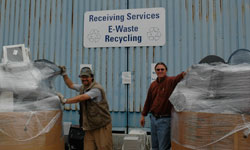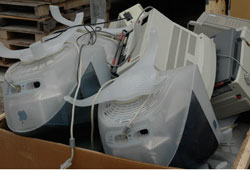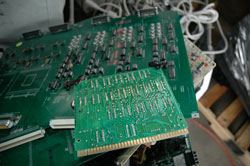When Steve Goldie looks at a broken old printer tossed in a box of obsolete electronic equipment at UCSC's Receiving Services, he doesn't see a piece of plastic, metal, and hazardous waste headed for eternal life in a trash heap.
To the Receiving Services manager, the piles of so-called "e-waste" at UCSC's receiving area on Delaware Avenue represent UCSC's commitment to recycling.
"We're really trying to divert as much waste as possible from going into landfills," said Goldie, while standing next to a box of mixed e-waste--from discarded cameras to outdated computers and printers--on a recent overcast weekday morning. "That's the goal."
On Wednesdays from 9 a.m. to 4 p.m., Receiving Services offers free self-service drop-off of e-waste for recycling at its 2300 Delaware Avenue facility. Drop-offs can also be made by appointment.
Examples of e-waste include air conditioners, CD/DVD/VCR players, cell phones, medical equipment, TVs, wires, cords, and cables, and more.
He estimated that the campus sends approximately 4,000 pounds of e-waste off for recycling a month. Even with an awareness program by Housing Services, the amount goes up about 25 percent during student move-out periods, since students often abandon goods such as TVs, monitors, stereos, lamps, and microwaves.
Receiving Services resells a small amount of refurbished items as surplus.
UCSC has been recycling e-waste since 2000. But the campus recently contracted with Direct Computer Disposal of San Leandro in order to comply with a recent UC Office of the President requirement that campuses contract with recyclers who have signed on to the True Stewardship Pledge, an agreement that the recycler will abide by a set of eight rules.
The rules include agreeing not to allow hazardous e-waste to be exported to developing countries or sent to prisons for recycling, and ensuring that every stop on the recycling chain meets environmental and health regulations.
The reason for signing on with such recyclers "revolves around the sustainability effort we've got going," said Goldie, referring to UCSC's work to advance environmental and conservation programs.
It's also the law. California enacted landmark legislation in 2003 to establish a funding system for the collection and recycling of certain electronic wastes. The California Integrated Waste Management Board has adopted regulations to implement portions of the statute.
Unfortunately, electronic discards are one of the fastest-growing segments of the nation's waste stream, according to the California Integrated Waste Management Board. The goal of e-waste legislation is to reduce waste, but also, certain components of some electronic products, such as cathode ray tubes from TVs and monitors, contain materials that make them hazardous.
The kind of stuff UCSC collects for recycling runs the gamut from old TVs to refrigeration units.
"We get a lot of older scientific gear, older things that have been in closets or wherever," said Kelly Mitchell, surplus administrator, picking up an old motherboard from a trash bin filled with them.
Recyclers smelt down e-waste for the metal and copper they contain, said Mitchell. And items such as circuit boards contain semi-precious and precious metals such as gold, silver, and palladium.
"Everything eventually gets broken down to the commodity level," Mitchell said.
For the campus, there's no real profit in collecting e-waste, said Goldie. Earnings offset Receiving Services operating costs for gathering the discarded electronics.
For information, visit the E-Waste Disposal Overview page or call Goldie at ext. 9-2852 or Mitchell at ext. 9-5589.
Contact the author at gwenm@ucsc.edu.





